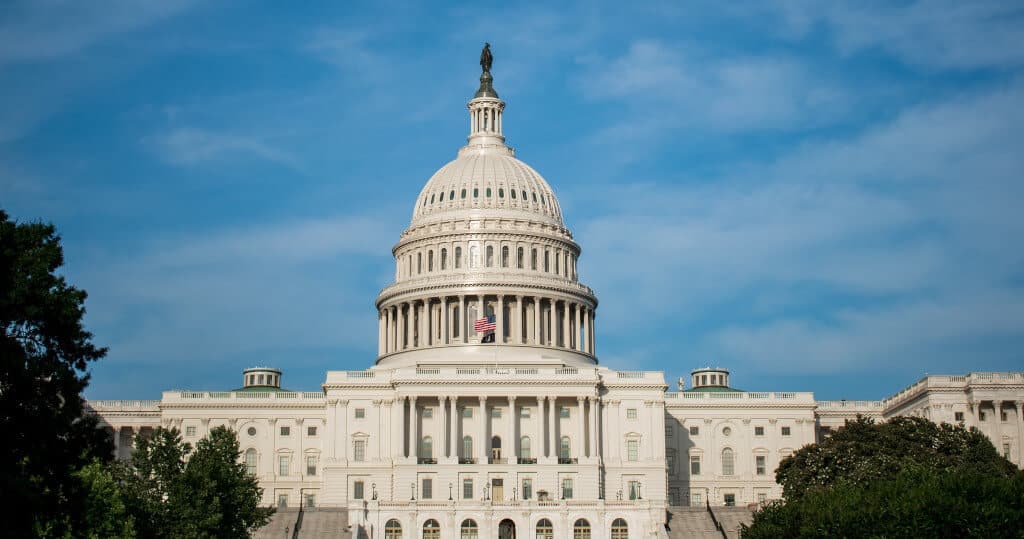What is a mandate?
Understanding Mandates
A mandate is an authoritative command that’s applied for a particular circumstance. It can be implemented easily and quickly.
Types of Mandates
A mandate is a command or directive issued by an authority to individuals or organizations, requiring them to take specific actions or follow certain rules.
Issuing Authorities
Mandates can be issued by various types of authorities, including governments, organizations, or individuals with a position of power or influence.
Binding Nature of Mandates
Mandates can be legally binding or non-binding, depending on the context and the authority issuing the mandate.
Purposes of Mandates
Mandates can be issued for various purposes, such as promoting public health, protecting the environment, or ensuring compliance with laws and regulations.

Get Smarter on US News, History, and the Constitution
Join the thousands of fellow patriots who rely on our 5-minute newsletter to stay informed on the key events and trends that shaped our nation's past and continue to shape its present.
Impact of Mandates
Mandates can have a significant impact on the individuals or organizations that are required to comply with them, influencing their actions and decisions.
Table showing key elements of what a mandate is:
| Key Elements | Description |
|---|---|
| Authority | The individual, organization, or government issuing the mandate |
| Scope | The specific actions or rules required by the mandate |
| Duration | The length of time for which the mandate is in effect |
| Enforcement | The mechanisms for ensuring compliance with the mandate |
| Consequences | The penalties or repercussions for failing to comply with the mandate |
What is a law?
On the other hand, a law is usually a long-term or permanent rule.
These laws are introduced and implemented through legislation. Those who don’t obey such laws will likely face a penalty, charge, or prosecution.
- A law is a rule or set of rules that are enforced by a governing authority, such as a government or court system.
- Laws are created to regulate behavior and maintain social order and are typically written down in legal codes or statutes.
- There are many different types of laws, including criminal, civil, and constitutional laws.
- Laws can vary by country, state, or jurisdiction and can be influenced by cultural, social, and political factors.
Table showing aspects of a law:
| Aspects of a Law | Explanation |
|---|---|
| Purpose | A law is created to regulate behavior and maintain social order |
| Enforcement | Laws are enforced by a governing authority, such as a government or court system |
| Types | There are many different types of laws, including criminal laws, civil laws, and constitutional laws. |
| Variations | Laws can vary by country, state, or jurisdiction |
| Influences | Laws can be influenced by cultural, social, and political factors |
What Are the Similarities Between a Mandate and a Law
- Once imposed, mandates and laws are both legally enforceable.
- They’re both controlled by those who implement and oversee them.
- The two serve a particular objective.

What Are the Differences Between a Mandate and a Law in the United States?
The process of implementing laws
Laws can take anywhere from a single week to months to be implemented. At times, the process can even take years.
First, the law must be drafted by the government or state body.
Once formulated, the appropriate legislative body discusses its details before finalizing the draft.

The length of time of discussion depends upon the current political climate. This is why the process can take from weeks to months.
When a consensus is reached between all parties involved in the agreement, voting must occur. If the majority shows the law to be in favor, it’s passed, and enactment proceedings begin.
If not, further discussions and debates must occur until the majority stands.
The process of implementing mandates
While laws need voting to take place, this isn’t the case for mandates.
Mandates involve what is known as unilateral decisions.
This means they are typically introduced by a government agency or elected official, such as a president or governor.
The main differences between mandates and laws
Laws need to be written before they can legally be authorized. The procedures include the voting process, debates, discussions, and amendment of the wording of the documents when needed.

This process all takes place within legislative bodies.
The length of time a mandate and a law differ, with a law lasting much longer (unless the Supreme Court strikes them down as repugnant to constitutional law). Part of the reason is due to the agreement process.
A mandate is called for when there’s a requirement for it, whatever that may be.
Some emergencies can lead to mandates being introduced, such as a pandemic, hurricane, earthquake, flooding, or any other unexpected disaster.

Mandates can only be made within the parameters set out by the appropriate legislative body and usually when a state of emergency has been declared.
Generally, once the issues are dealt with, the mandate is rescinded.
Mandate vs. Law FAQs
There are some important questions to consider when it comes to highlighting the differences between the two and understanding if a mandate is a law.
Does a governor impose a mandate or law?
The COVID-19 pandemic saw several governors throughout the United States face a backlash from voters and state legislatures. This was due to extensive mandates introduced regarding public health concerns and disease control.

These mandates had far-reaching implications, such as a COVID-19 vaccination or mask mandate.
New York Gov Kathy Hochul introduced a vaccine mandate for healthcare workers in the state that the New York Supreme Court later struck down.
Lawmakers in many states have sought to impede the ability of governors to make this kind of unilateral decisions.
What Is a Mandate in the United States?
A mandate is a formal order that deals with a particular situation. It can be introduced and implemented speedily, as mask mandates were during the COVID-19 pandemic.
Mandates have a limited life span, which is not necessarily the case for statutory or constitutional law.
As noted previously, legislators have used legislation to impede governors’ abilities to implement mandates.
What Is a Law in the United States?
On the other hand, a law is usually a long-term rule.

These laws are imposed through legislation or statutes. Those who don’t follow such laws will likely face a penalty, charge, or prosecution.
Are state mandates laws?
While it may come as a surprise, there are times when mandates and laws are the same. This depends upon the state.
A state mandate is a state law in some states.
State mandates are laws that are implemented with a particular reason behind them. They’re usually to effect a particular action and are overseen by local government authorities.
What’s the Verdict?
Mandates and laws aren’t generally the same, except for a few states.
Laws can take much longer to implement and are done so by a legislative body.
Mandates, on the other hand, can be enforced quickly and don’t necessarily require governmental oversight.
Table showing differences between a law and a mandate:
| Aspects | Law | Mandate |
|---|---|---|
| Definition | A law is a rule or set of rules enforced by a governing authority, such as a government or court system. | A mandate is a requirement or directive issued by an authority or governing body. |
| Enforcement | Laws are typically enforced through legal action and penalties, such as fines or imprisonment. | Mandates may be enforced through various means, such as fines, loss of privileges, or legal action. |
| Purpose | Laws are created to regulate behavior and maintain social order. | Mandates are issued to achieve specific goals or outcomes, such as public health or safety. |
| Scope | Laws may cover a wide range of topics and apply to all individuals within a given jurisdiction. | Mandates may be more limited in scope and may only apply to certain groups or situations. |
| Authority | Laws are typically created and enforced by a government or court system with legal authority. | Mandates may be issued by various authorities or governing bodies, including government agencies, businesses, or organizations. |
| Penalties | Violating a law can result in legal consequences, such as fines, imprisonment, or other penalties. | Violating a mandate may result in consequences determined by the issuing authority, such as fines, loss of privileges, or legal action. |
Examples of Laws:
Speed Limits: Traffic laws dictate specific speed limits that must be obeyed by all drivers on public roads. Violating these laws can result in fines or legal penalties.
Criminal Code: Criminal laws outline various offenses, such as theft, assault, or murder, and specify the penalties for those found guilty. These laws are enforceable by law enforcement agencies and can lead to imprisonment.
Tax Laws: Tax laws establish the rules for calculating and paying taxes. Failure to comply with tax laws can result in financial penalties and legal consequences.
Environmental Protection Laws: These laws set regulations for emissions, waste disposal, and other activities that impact the environment. Violating environmental laws can lead to fines and legal actions.
Constitutional Laws: A country’s constitution defines its fundamental principles and government structure. Constitutional laws are the highest legal authority and often require amendments to special procedures.
Examples of Mandates:
Mask Mandates: During a public health crisis, authorities may issue mandates requiring individuals to wear masks in public spaces. Non-compliance may result in fines or restrictions, but it’s typically not a criminal offense.
Business Regulations: Authorities can mandate that businesses follow specific safety or operational guidelines. Failure to comply may lead to fines or temporary closure, but it’s not criminal.
Travel Advisories: Governments may issue travel mandates advising against visiting certain countries or regions due to safety concerns. Travelers are encouraged to follow these advisories, but they are not legally required.
Quarantine Orders: Public health officials may mandate individuals to quarantine if exposed to a contagious disease. Non-compliance may result in fines, but it’s generally not a criminal offense.
School Policies: Educational authorities may issue mandates for students to follow dress codes, attendance policies, or behavioral guidelines. Violations typically result in disciplinary actions but are not criminal offenses.
Understanding Laws and Mandates
In summary, laws are legal rules and regulations established by governments that carry the force of the legal system, often with criminal penalties for violations.
Mandates, on the other hand, are directives or orders issued by authorities, which may include governments, but they often carry civil penalties or administrative consequences rather than criminal charges.





3 Responses
What happens when laws conflict each other ? which law IS the law ?
I would like to know how the state of Massachusetts has the right to mandate a charge on my National Grid bill a charge for a Distributed Solar Charge when I don’t have Solar. Why am I paying for someone else’s decision to have solar? That’s 100% wrong.
I look forward to hearing from you.
does a mandate from an appeals court ordering further proceedings superseded lower court orders and void them until the mandate effectuated and completed